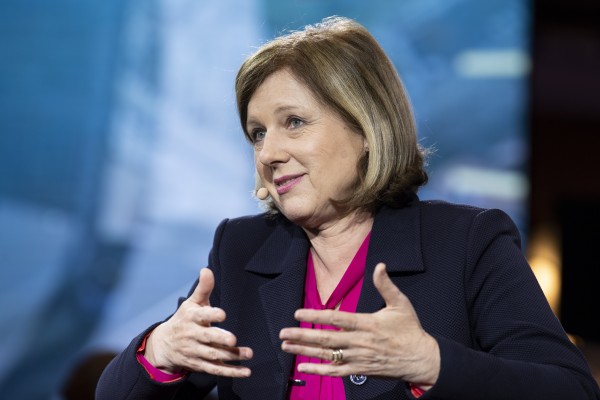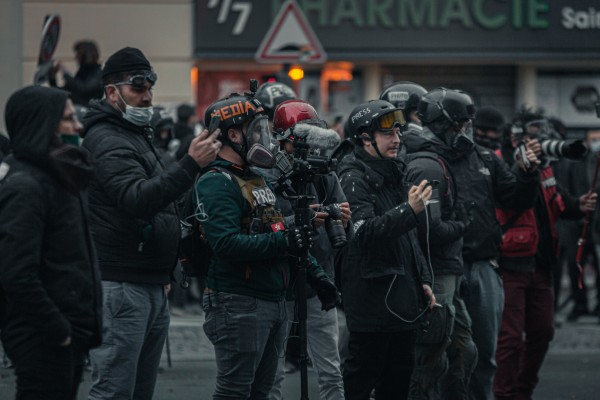There is a light at the end of the tunnel after media capture, and different strategies are being developed at the political and economic level to help safeguard independent media from hostile takeovers, panellists agreed during a discussion at the IPI World Congress in Vienna on May 26.
While undemocratic models of controlling media ecosystems are spreading across national borders and many states around the world continue to experience entrenched media capture, increasing international attention is now being given to the issue and solutions are being developed, they said.
“We have no choice but to see the light at the end of the tunnel”, said Beata Balogová, the editor-in-chief of influential Slovak daily newspaper SME, who moderated the session Cutting Loose from Media Capture at the IPI World Congress. “Autocrats are counting that we will give in”, she added, saying that support for existing independent media was crucial.
“Media capture has become the main export product of Hungary”, she said. “Victor Orbán was able to create a propaganda machine in a European Union member state, which in its effect even surpasses the Communist propaganda system.” She added: “The Orban model inspires autocrats across the region”, citing the former Slovak prime minister Robert Fico in Slovakia as an example.
Márton Gergely, editor-in-chief of Hungary’s leading political weekly, HVG, said that in the past decade the Fidesz government had entrenched the strongest form of media capture seen anywhere in the EU, with damaging effects on democracy and a fair playing field for elections.
Hostile takeovers of previously independent media houses by business groups and oligarchs close to the government have slowly eroded pluralism and hollowed out the space for independent journalism, he explained. The few remaining independent media “are in a golden cage”, he said, with distortion of the media market down political lines severely undermining their viability. “There is a shift in the definition of journalistic success on the side of the independent media. Journalistic success now simply means survival.”
Sreenivasan Jain, an award-winning television journalist in India whose quit his job at NDTV after it was taken over in 2022 by the country’s richest person, a businessman close to Prime Minister Narendra Modi, said his country’s press landscape was also in in a state of media capture in which “a large swathe of the mainstream media, particularly television networks, have either become propagandists of the government or take a very safe line” in reporting on the government.
“We have probably the most diverse and large media market in the world, with at least 400 registered television channels and 100,000 registered newspapers”, he said. “It is not as if India always had a great record of press freedom. It was always fragile. But this vastness provided you with a sense of diversity in terms of opinion.” However, after years of fragmentation in the market and tabloidization, the arrival of the Modi government “took a sledgehammer to this fragile system”, he said.
Somewhat like the Orbán model in Hungary, he said, Modi justified the capture and control over media outlets via their owners in India as “ideological correction” of the media and public opinion in favour of the country’s Hindu majority. “That was the visible rhetoric”, he added. “But at the same time, we saw a mixture of intimidation, cutting off access, and outright raids and punitive actions against media houses” which brought independent media critical of the government into line. “Invisibly, this vast media landscape was brought to heel. If you tried to resist, there were consequences.”
Turning back to Europe, Lucie Sýkorová, a Czech media expert and chair of the supervisory board at the European Centre for Press and Media Freedom (ECPMF), pivoted to look at potential solutions being developed to unwind media capture. She presented the draft provisions of the European Media Freedom Act (EMFA), a landmark initiative of the European Commission that is intended to safeguard independent media across the bloc.
Proposed new EU rules on independent public service media, fair and transparent allocation of state advertising to media, independence of national media regulatory bodies, and rules on editorial interference in newsrooms would provide welcome new defences in member states facing challenges from media capture, she said. However, the proposal is now facing pressure on all sides, she added. “The negative reactions in states like Hungary and Poland, as well as other states like Germany, have been strong”, she said.
Turning to other options for protecting independent media from hostile takeovers, Patrice Schneider, chief strategy officer at the Media Development Investment Fund (MDIF), said targeted investment in markets vulnerable to capture formed an essential piece of the puzzle.
In recent years in Europe, he said, MDIF has made major investments in Petit Press in Slovakia, the owner of SME, after the exit of the controversial publishing house Penta, as well as in Agora in Poland, which publishes the storied daily Gazeta Wyborcza, with a third investment in Poland soon to be announced. Other investments are now being eyed across the region, Schneider added.
“Describing MDIF as “a blend between a human rights organization and an investment”, he said that they had already raised 50 million of their 100-million-euro target, which would be invested in independent media around the world to help safeguard them from takeovers by oligarchs or problematic business interests and guarantee their independence, Schneider said. “This is an important but fragile innovation”, he said, which could be replicated around the world.
The 2023 IPI World Congress and Media Innovation Festival gathered leading journalists, editors, and publishers from around the world in Vienna from May 25 to 26, 2023, to explore the rapidly evolving global and technological landscape for independent journalism. Under the theme “New frontiers: Press freedom and media innovation in the age of AI”, the event focused on securing the future of news media, building on the solid footing of the past.
Watch the whole panel here: Cutting Loose from Media Capture. The panel was supported with funding from the Friedrich Naumann Foundation for Freedom (FNF).
Read more about IPI’s work regarding media capture in Europe ↓



